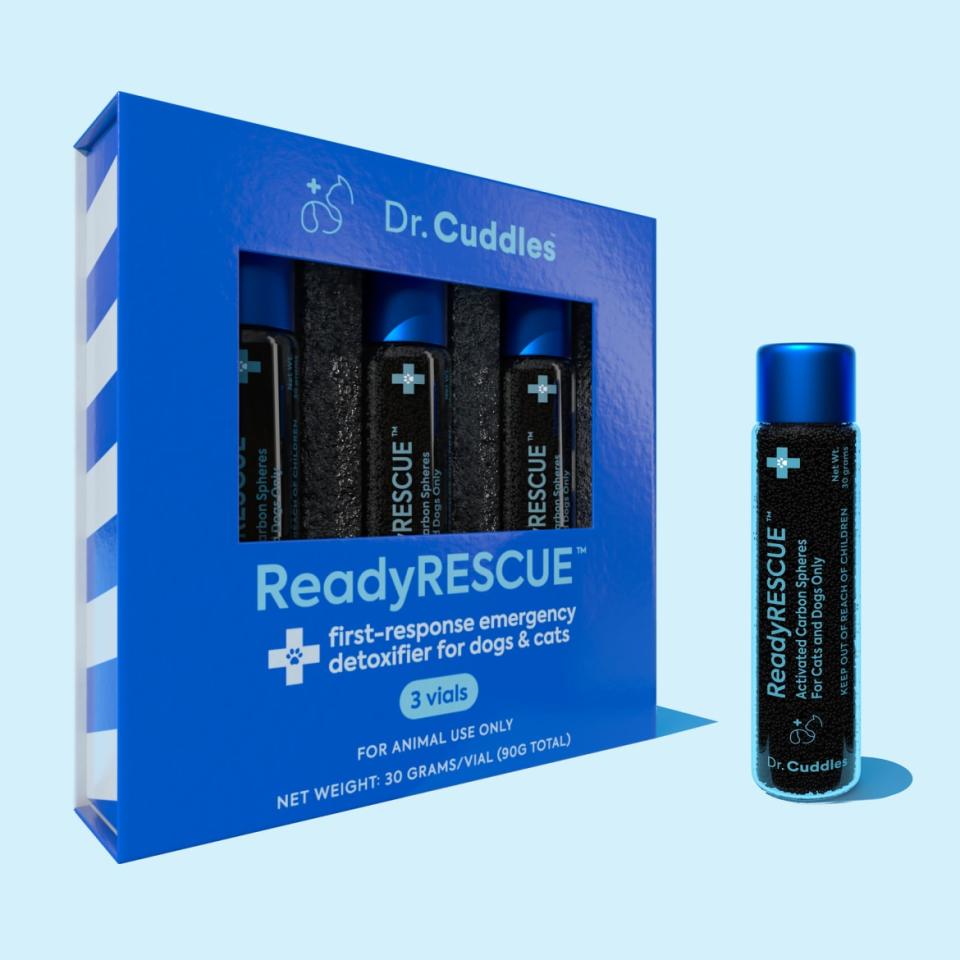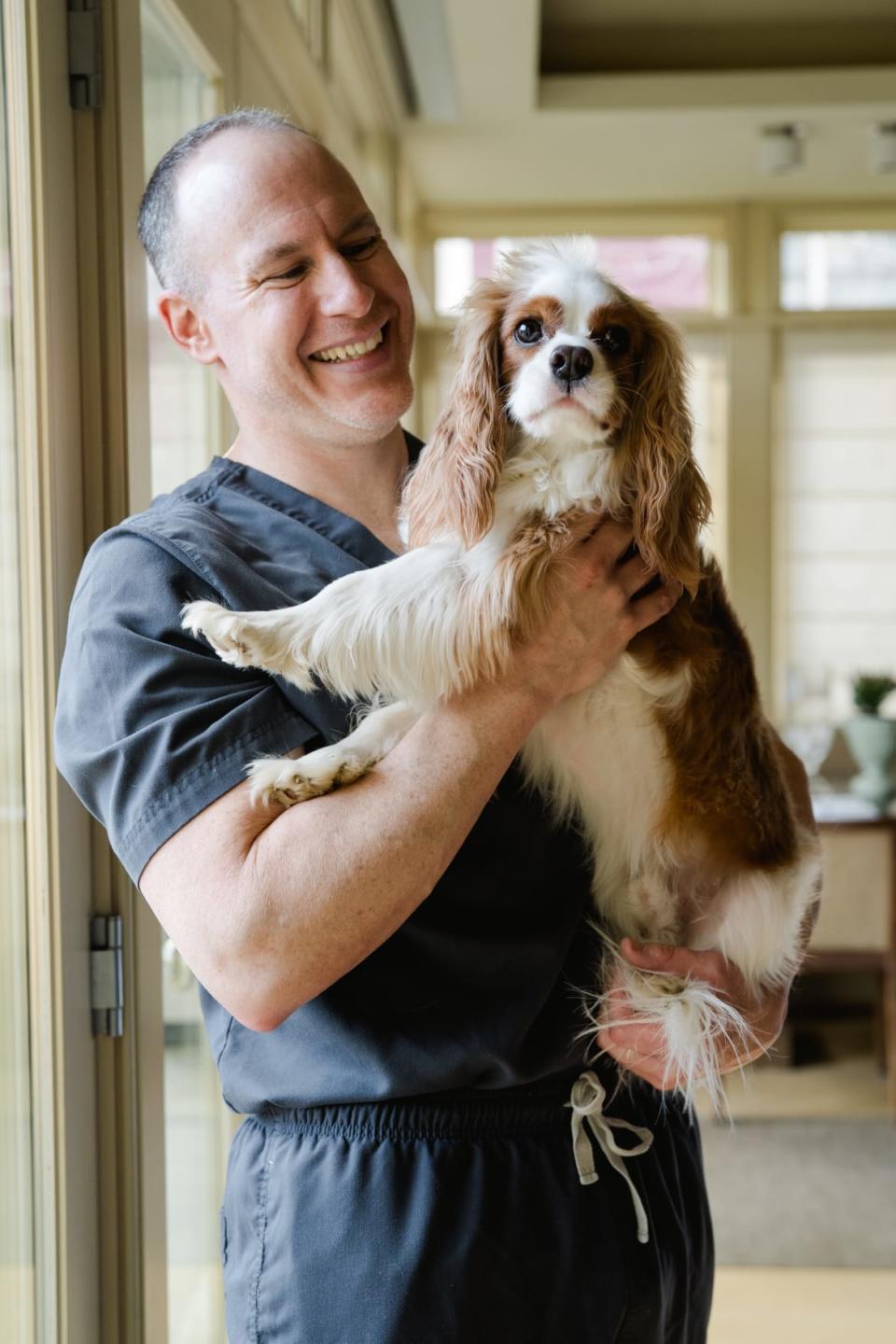How ReadyRESCUE Can Save Your Pet From Accidental Overdoses

In fall 2023, Katie Scott came home after work and saw that her black Labrador mix Chowder had broken out of her crate and gotten into a bottle of children’s liquid ibuprofen. “She’s a 1-year-old Lab, so naturally she’s a little mischievous,” Scott told The Daily Beast.
Scott, who is a veterinary technician, says that human medication like Advil and Tylenol can be harmful to internal organs in dogs, causing gastrointestinal, kidney, and liver issues. She knew she was working against the clock to get Chowder the care she needed.
Before she called her local veterinary hospital, though, Scott reached for ReadyRESCUE, an at-home animal detoxifier that works to absorb toxins before a pet’s body does, buying pet owners time to get to a veterinarian.
“As a veterinary technician, I have experience administering traditional charcoal and it’s very messy,” Scott said, adding that most pet parents don’t have the activated charcoal product—a common antidote used in veterinary hospitals to rid animals of toxins—that veterinarians administer.

Chowder the dog.
Scott said for her, ReadyRESCUE’s most valuable asset is being able to give it at home, because every minute matters after pets have ingested toxins, and gives pet owners a minute to breathe before calling poison control or the vet clinic.
ReadyRESCUE, manufactured by the brand Dr. Cuddles, is made of activated carbon spheres which can be mixed with another ingredient, such as peanut butter, to give to pets who have ingested toxins at home. This can include human medications, chocolate, and recreational drugs like THC. The charcoal absorbs the toxin, binding harmful ingredients to the spheres instead of your pet’s bloodstream, and then is safely eliminated in a cat or dog’s feces without causing damage to internal organs or the gastrointestinal tract.
One box costs $134 and contains three vials—and dosage is based on the size of the animal. Scott says she administered Chowder’s dosage “very easily” using peanut butter and her dog “gladly ate the whole thing.”
“I still got in touch with an emergency doctor from the hospital to check the dose of ibuprofen she ingested to make sure Chowder wouldn’t require any hospitalization,” Scott said.
How AI Can Help Treat (and Cure) Your Dog’s Cancer
While charcoal administration for pets who have ingested a toxin isn’t new (activated charcoal is a common protocol used in pet hospitals) ReadyRESCUE’s charcoal spheres provide pet owners a first-of-its kind tool that can be used at home. It’s a concept that excites founder, Mat Glassman, a board-certified veterinary surgeon in Washington, D.C. who spent three years developing the product.
“I know that it will save lives and make veterinarians’ jobs easier,” Glassman told The Daily Beast. “It’s meant to be administered when we have the window to be most effective—at home as soon as a toxin ingestion is suspected.”
Though intended for accidental toxin ingestion, Glassman noted that there are some toxins ReadyRESCUE will not be effective against, including xylitol, which is a sweetener found in products like gum; and ethylene glycol, or antifreeze. For pet owners like Scott, though, the product is a “comforting” tool to have on hand.
“The nice thing about ReadyRESCUE is it is safe to give even if you aren’t sure what or how much your pet got into,” she said. “If they didn’t ingest a toxin, the charcoal beads will just run through the intestines without causing any damage.”

Benjamin Brainard, professor of small animal emergency and critical care at University of Georgia’s College of Veterinary Medicine, told The Daily Beast that he has not used ReadyRESCUE in his practice, but is familiar with the product and offered a recent scenario where it may have been useful. A patient of his was on an island in South Carolina and their dog got into human medication.
“The nearest vet was a couple hours away, so she called me asking for help,” the Athens, Georgia-based specialist said. “If she had been able to administer the activated charcoal at home, it probably would have been a beneficial way to prevent absorption of this toxin while she was en route to the veterinarian.”
In this case, Brainard said that the alternate option was to induce vomiting using hydrogen peroxide. “This means first you have to have hydrogen peroxide in the house—and hydrogen peroxide turns into water after about six months, so it has to be a new bottle,” he explained, adding that administering hydrogen peroxide comes with its own risks, such as mouth irritation, and is best done under the supervision of a veterinarian.
”Vomiting also does not always bring up the toxin in its entirety,” he added.
Brainard emphasized that giving a product like ReadyRESCUE at home can help, not hurt, animals. “I think the best way to think of ReadyRESCUE is a bridge,” Brainard told The Daily Beast. “The animal is still going to need to see a veterinarian.”
Barking Up the Wrong Tree
While some emergency veterinarians support the product and see the value, others are not convinced.
Lauren Darwin, an emergency veterinarian in Tucson, Arizona called ReadyRESCUE “a dangerous product” for consumers and told The Daily Beast that after a pet ingests any toxin, the first step should be contacting ASPCA’s Pet Poison Control Center, a 24/7/365 helpline available by calling (888) 426-4435, followed by taking them to the nearest emergency room for treatment.
“As an emergency veterinarian, I see toxin ingestion quite often, and especially common ones that ReadyRESCUE claims to be effective against, such as chocolate intoxication, grapes, and prescription medication overdoses,” Darwin said.
The Arizona-based veterinarian emphasized that charcoal alone is not enough to decontaminate toxins from pets’ bodies. “I worry that this product falsely gives the impression that you can give this at home and can deter people from seeking out veterinary care because they believe this product will be enough,” she said.

Dr. Glassman and his dog.
Darwin added that while charcoal may be recommended for some types of toxin ingestions, there are life-threatening issues that can arise by giving charcoal at home.
“Pets often vomit if they have ingested a toxin,” Darwin said. “Giving charcoal at home poses a huge risk for them to vomit at home and then aspirate and become ill with aspiration pneumonia, which is life threatening.”
Glassman admitted that vomiting is a valid concern when pets ingest toxins—but one that is faced regardless of if charcoal is given at home or at a hospital. He cited medical studies, including one on the use of hydrogen peroxide to induce vomiting, that underscore the importance of time when treating animals that have ingested toxins.
“The fact that ReadyRESCUE could be given at home well before puking or gastric lavage at a hospital would suggest that prevention of absorption would be that much better,” he said.
While Glassman accepts the concern regarding vomiting, he is adamant the product is not intended to be a replacement for professional veterinary care, but a solution for time-critical emergencies, such as toxin ingestion.
“I think about ReadyRESCUE like CPR,” he explained. “If you’re giving someone CPR, you’re not saying, ‘Give them CPR, and don’t call 911 or go to the hospital.’ You’re saying, ‘Give them CPR while you call or until you get to the hospital.’”
Get the Daily Beast's biggest scoops and scandals delivered right to your inbox. Sign up now.
Stay informed and gain unlimited access to the Daily Beast's unmatched reporting. Subscribe now.

